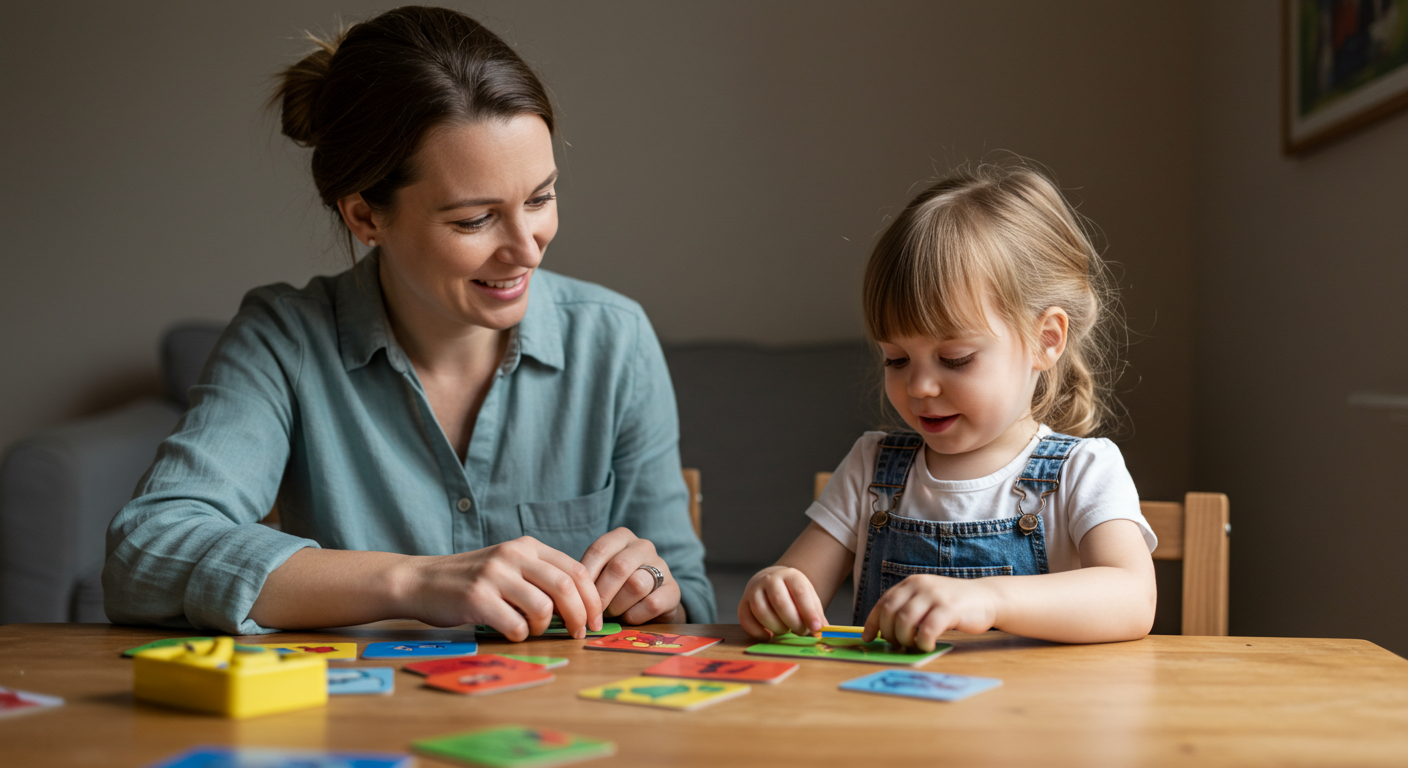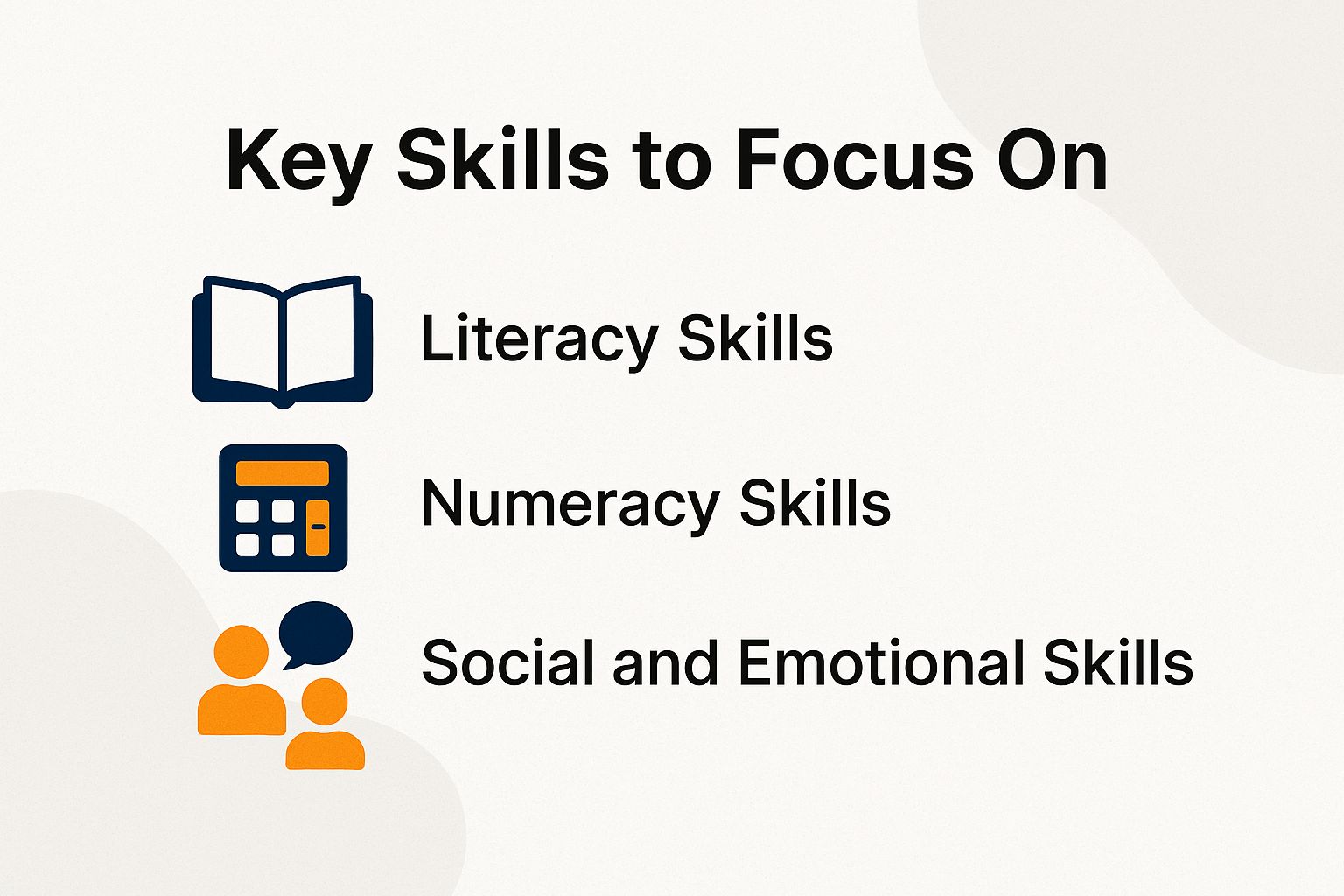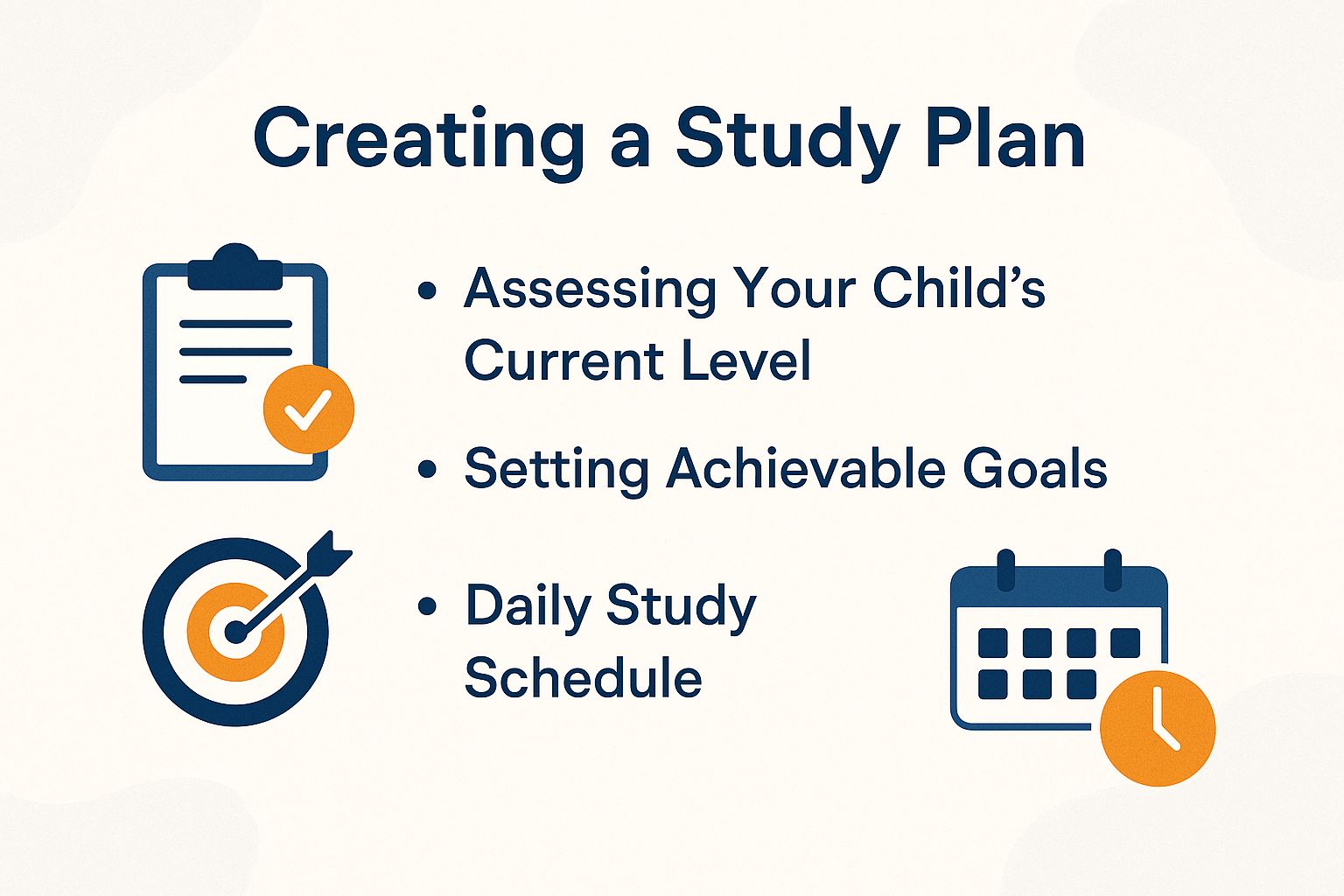
How to Prepare My Child for The 4+ Assessment
Getting your child ready for the 4+ assessment can feel overwhelming, but it doesn’t have to be! Understanding what this assessment entails and how to best prepare your little one can make all the difference.
We’ll explore the structure of the assessment, key skills to hone in on, and practical tips for creating an engaging study plan. Plus, we’ll share some fun ways to keep your child excited and reduce any test anxiety. Let’s dive in!
What is the 4+ assessment?

The 4+ assessment serves as a comprehensive evaluation tool aimed at determining the cognitive, social, and emotional readiness of children aged 4 to 5 years. This assessment is designed to evaluate foundational skills through a variety of question formats.
Utilising interactive play and structured tasks, the assessment focuses on essential areas such as vocabulary, counting, and fine motor skills. For instance, children may be asked to identify colours or count objects, which provides valuable insights into their verbal and numerical abilities. Social skills are assessed through group activities where cooperative play can be observed.
Parents play a crucial role in supporting their children’s development by engaging them in daily activities that reinforce these skills. Utilising resources such as educational apps or simple board games can create a robust learning environment that fosters growth in these fundamental areas.
Purpose of the Assessment
The primary purpose of the 4+ assessment is to identify children’s strengths and weaknesses, ensuring they achieve key developmental milestones that are essential for academic success. This assessment serves as a valuable tool for both parents and educators, as it provides a detailed understanding of a child’s readiness for formal schooling.
For parents, it offers actionable insights that enable them to support their child in specific areas, such as literacy or social skills. Educators also benefit from this information, as it allows them to tailor their instructional strategies to create a more personalised learning environment.
For example, a child who is struggling with fine motor skills may need additional practice with writing, while another child who excels in reasoning might be given advanced problem-solving tasks to keep them engaged and challenged.
Understanding the Assessment Structure
It is essential to understand the structure of the 4+ assessment in order to effectively prepare children. This assessment comprises various question types designed to measure different skill sets, which can significantly influence how children perform. For a deeper understanding, those curious about the specifics might appreciate our guide on 4+ entrance exams.
Types of Questions
The 4+ assessment includes a range of multiple-choice questions, visual puzzles, and oral prompts designed to provide a comprehensive evaluation of a child’s cognitive abilities and problem-solving skills. This assessment uses various question types to focus on different aspects of cognitive development.
For example, multiple-choice questions are used to measure logical reasoning, while visual puzzles are employed to evaluate spatial awareness.
To help prepare your child, it is beneficial to encourage them to practise similar activities at home. Online resources, such as Khan Academy, offer excellent maths challenges and visual brain teasers.
Additionally, you might consider incorporating oral reasoning games like ‘20 Questions‘ to enhance their verbal skills.
Engaging in these activities regularly can significantly boost your child’s confidence and improve their performance during the assessment.
Scoring Criteria
Scoring for the 4+ assessment is conducted using a standardised rubric that evaluates children’s responses across cognitive, social, and emotional domains, offering a comprehensive view of their readiness for school.
The assessment employs a scoring scale from 1 to 4, where a score of 4 indicates advanced skills and a strong readiness for school, while a score of 1 points to significant developmental concerns.
Parents can anticipate receiving detailed feedback that highlights their child’s strengths, such as problem-solving abilities, as well as areas that may require additional support, such as social interactions.
Following the assessment, a report is typically provided, along with recommendations for at-home activities designed to encourage growth. These activities may include:
- Reading together
- Participating in cooperative games to help enhance social skills
Key Skills to Focus On

Emphasising key skills such as literacy, numeracy, and social-emotional learning is crucial in preparing children for the 4+ assessment and their future academic journeys. To further enhance these skills, utilising summer holiday learning activities can be highly beneficial. These foundational skills not only support their immediate assessment needs but also lay the groundwork for their overall educational success.
Literacy Skills
Literacy skills, such as phonemic awareness and vocabulary development, serve as the foundation for reading success, making them a central focus in preparing for the 4+ assessment.
To enhance these skills, you might consider incorporating activities like shared reading sessions, where you discuss various story elements together.
Additionally, utilising phonics applications, such as Starfall, can provide engaging and interactive learning experiences.
It’s also beneficial to track vocabulary growth by maintaining a weekly log of new words learned and using them in sentences to provide context.
Implementing rhyme games can further strengthen phonemic awareness.
These strategies will not only help prepare children for the assessment, but they will also nurture a lifelong love of reading.
Numeracy Skills
Numeracy skills, including counting, number recognition, and basic addition, are essential for children’s academic readiness and are assessed in the 4+ assessment. To support the development of these skills, it can be beneficial to incorporate enjoyable activities into daily routines.
For instance, engaging in counting games like “Count the Apples” during snack time can make the learning process more interactive. Additionally, apps such as Todo Math offer engaging exercises and allow for progress tracking; studies have shown that consistent use of such apps can enhance numeracy skills by up to 30% in just a few months.
Establishing a regular practice schedule—perhaps dedicating ten minutes each day—can also effectively reinforce these skills, ensuring that your child is well-prepared for the assessment.
Social and Emotional Skills
Social and emotional skills are crucial for enabling children to interact positively with both their peers and adults, making them essential components of the 4+ assessment.
To enhance these important skills, consider engaging children in role-playing activities that allow them to practise various social scenarios. For instance, you could have them act out greeting a new classmate or resolving a disagreement.
In addition, games that require teamwork, such as ‘Capture the Flag‘ or cooperative building tasks, can effectively foster collaboration and communication among children.
To evaluate their progress, it may be beneficial to ask reflective questions like,
“How did you feel during that activity?” or “What could you do differently next time?”
These strategies not only help build essential skills but also create valuable opportunities for self-reflection.
Creating a Study Plan

Developing a structured study plan is essential for effective preparation for the 4+ assessment. This approach ensures that children can acquire all the necessary skills in a manageable and systematic manner.
Related insight: Consider exploring Academic Success for more online tuition resources that cater to the 4+, 7+, and 11+ exams to further enhance your study plan.
Assessing Your Child’s Current Level
It is important to begin by assessing your child’s current skill levels through informal assessments and observation. This will help establish a baseline for your study plan. You might start with simple checklists or rubrics that focus on key developmental areas such as literacy, numeracy, and social skills.
For example, when evaluating literacy, take note of your child’s ability to recognise letters, sound out words, and comprehend short texts. In terms of numeracy, you can assess skills like counting, basic addition, and number recognition.
To gain further insights, consider utilising tools such as the Ages and Stages Questionnaire or participating in parent-teacher meetings.
As time goes on, it is essential to reevaluate these skills periodically. This will allow you to adjust your study plan as needed, ensuring that it remains aligned with your child’s progress and development.
Setting Achievable Goals
Setting achievable goals based on your child’s assessment results allows for focused practice that targets specific areas for improvement.
When establishing SMART goals, it’s helpful to consider specific literacy objectives, such as:
- “Read for 20 minutes each day,”
- or numeracy goals, like “Complete one maths worksheet each week.”
These goals should be measurable, which can be done by tracking the time spent reading or the number of worksheets completed.
It is also important to ensure that the goals are achievable by evaluating your child’s current abilities. For instance, if your child can currently read for only 10 minutes, it would be reasonable to start with a goal of 15 minutes.
Additionally, keeping the goals relevant to your child’s interests can enhance motivation. This might involve selecting books that cover their favourite subjects.
Lastly, setting a timeline—perhaps by the end of the term—can help facilitate progress and allow for necessary adjustments along the way.
Daily Study Schedule
Establishing a daily study timetable is essential for maintaining consistency and balance while preparing for the 4+ assessment, ensuring that time for play and rest is also factored in.
To create an effective timetable, it is advisable to allocate specific time blocks for each subject. For instance, one could begin the day with an hour dedicated to maths from 9 AM to 10 AM, followed by a 30-minute break. After the break, transitioning to language arts from 10:30 AM to 11:30 AM can be beneficial. Utilising tools like Google Calendar can help set reminders and track progress effectively.
Additionally, it may be helpful to incorporate a 15-minute review session at the end of each day to revisit the subjects covered. It is equally important to include leisure activities, such as taking a walk or reading, to keep the mind refreshed and engaged.
Resources for Preparation
Utilising a diverse range of educational resources is essential for comprehensive preparation for the 4+ assessment. This approach accommodates various learning styles and preferences, ensuring that everyone can engage with the material in a way that works best for them.
Books and Workbooks
Books and workbooks such as The Big Book of Early Learning (£15) and Preschool Maths Workbook (£10) offer structured practice in essential literacy and numeracy skills. To enhance these resources, it may be beneficial to incorporate Hands-On Learning Activity Cards (£12), which provide interactive methods to engage children in various learning activities.
Furthermore, The Complete Book of Maths, Years 1-2 (£18) serves as a comprehensive guide for developing foundational maths skills through enjoyable exercises. Shopping for these materials can be conveniently accomplished through platforms like Amazon or at local educational supply shops, which often feature sales or bundle offers that make the acquisition of these resources more accessible and cost-effective.
By combining these tools, one can create a well-rounded educational experience for children.
Online Resources and Apps
Online resources and applications such as Khan Academy Kids (which is free) and ABCmouse (priced at £10 per month) provide interactive learning experiences that align with the requirements of the 4+ assessment. Effectively utilising these platforms can significantly enhance young learners’ understanding of essential concepts.
For instance, Khan Academy Kids offers a customised curriculum filled with games and activities designed to accommodate various learning styles, making it an excellent choice for diverse classrooms. On the other hand, ABCmouse presents structured lessons that cover important subjects such as maths, reading, and art, allowing for easy progress tracking.
Incorporating daily sessions—15 to 20 minutes on Khan Academy Kids followed by a structured lesson on ABCmouse—ensures a well-rounded approach to learning engagement. Consistency in these practices is vital for long-term retention and skill development.
Practice Tests
Utilising practice tests from resources such as Education.com or CTCMath can help children become familiar with the assessment format while simultaneously reinforcing their skills.
Plus Education.com, consider exploring websites like Khan Academy, which offers personalised practice questions that cater to various skill levels—ideal for targeted review.
For a more comprehensive testing experience, you might access free tests from the National Centre for Education Statistics (NCES), which closely reflect real-world exam conditions.
It’s beneficial to set a timer while taking these practice tests to simulate the pressure of actual assessments. Aim for test sections lasting 30 to 45 minutes to help build both endurance and speed.
After completing the tests, encourage your child to thoroughly review their answers to identify areas where they can improve.
Engaging Your Child in the Process

Involving your child in the assessment preparation process fosters a positive learning environment, making the experience both enjoyable and effective.
Making Learning Fun
Incorporating enjoyable play-based learning activities, such as educational games like Zingo! (£20) or scavenger hunts, can cultivate a genuine love for learning while reinforcing essential skills. Engaging children in these activities not only enhances their cognitive abilities but also promotes the development of social skills.
For example, playing Zingo! helps sharpen recognition and vocabulary through collaborative play, while scavenger hunts encourage critical thinking and problem-solving skills.
To maximise the benefits of these activities, it may be helpful to implement themed scavenger hunts centred around subjects such as maths or science, thereby reinforcing key concepts from the curriculum.
Resources like printable scavenger hunt lists or apps like GooseChase can be invaluable for organising these activities, ensuring they remain both entertaining and educational.
Incorporating Play-Based Learning
Utilising play-based learning strategies, where children acquire knowledge through play, can significantly enhance engagement and solidify the foundational skills necessary for the 4+ assessment.
It may be beneficial to incorporate activities such as building blocks, which promote spatial awareness and fine motor skills.
Toys like LEGO Duplo can encourage creativity while simultaneously fostering social skills through collaborative construction.
Board games like “Candy Land” can be useful for teaching children about turn-taking and rule-following, both of which are essential for positive social interactions.
For emotional development, role-play sets—such as doctor kits or kitchen sets—allow children to explore various feelings and scenarios.
Regular engagement in these activities not only supports cognitive learning but also nurtures social and emotional growth, making them essential components of early childhood education.
Managing Test Anxiety
Managing test anxiety is essential for children preparing for the 4+ assessment, as maintaining a positive mindset can greatly influence their performance. For strategies to help build resilience and foster a growth mindset, which are critical components in overcoming anxiety, see also: Growth Mindset for Young Learners: Building Resilience for Exams.
Creating a Positive Mindset
Encouraging a positive mindset can be achieved through the use of affirmations and a focus on effort rather than outcomes, which helps children approach the 4+ assessment with confidence.
Consider introducing daily affirmations, such as “I am capable and ready to learn,” which children can recite each morning to help build their resilience. Additionally, implementing a success journal allows children to document their small achievements, such as completing a challenging homework assignment or helping a friend. This practice promotes a growth mindset by emphasising their progress.
Furthermore, holding regular reflection sessions, perhaps on a weekly basis, can reinforce the significance of their efforts and foster a sense of accomplishment. This combination of strategies effectively builds confidence and prepares children for their upcoming assessments.
Relaxation Techniques
Introducing relaxation techniques, such as deep breathing exercises and mindfulness practices, can significantly assist children in managing anxiety prior to the 4+ assessment.
One effective and straightforward method is the ‘5-5-5’ technique. You can guide your child to inhale deeply for five seconds, hold that breath for another five seconds, and then exhale slowly for an additional five seconds. This practice can help them feel more grounded and calm.
Additionally, consider dedicating 10 minutes each day for a family mindfulness session. Utilising resources like the ‘Headspace’ app, which provides guided practices tailored for children, can be beneficial. Participating in these activities together not only promotes relaxation but also enhances family bonds.
Frequently Asked Questions
What is the purpose of the 4+ assessment?
The 4+ assessment is a standardised test designed to evaluate a child’s readiness for entry into a selective or independent school. It assesses a child’s academic abilities, social skills, and overall development.
When should I start preparing my child for the 4+ assessment?
It is recommended to start preparing your child at least six months prior to the assessment date. This will allow enough time for your child to become familiar with the test format and build the necessary skills.
How can I help my child prepare for the 4+ assessment?
There are various ways to prepare your child for the 4+ assessment, including practising with mock tests, working on academic skills, and promoting social and emotional development through play and interaction.
What skills should my child focus on for the 4+ assessment?
The 4+ assessment evaluates a child’s language, math, and reasoning skills, as well as their behaviour and social skills. It is important to focus on developing these skills through age-appropriate activities and exercises.
What can I expect on the day of the 4+ assessment?
The 4+ assessment typically consists of individual and group activities, including tasks such as puzzles, storytelling, and role-playing. Your child will also have a short interview with a teacher or assessor.
What can I do to help my child feel more confident on the day of the 4+ assessment?
It is important to reassure your child that this is just a fun activity and not something to be worried about. Encourage your child to do their best, but also remind them that their worth is not defined by the results of the assessment.



